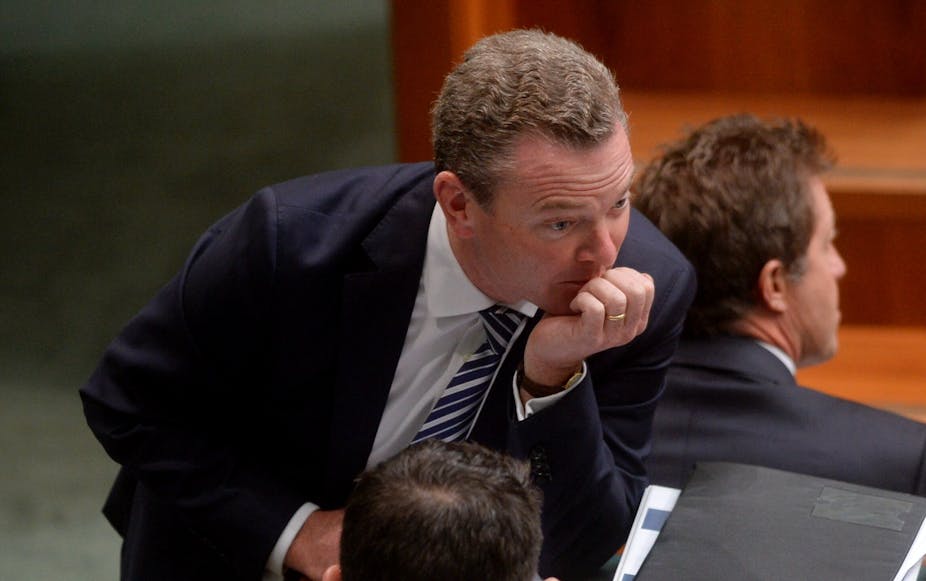Tonight’s budget will produce few surprises for education funding. The deregulation of university fees, increased support for independent public schools, re-prioritised research funding and a commitment to Gonski-lite for the next four years are all likely outcomes.
Despite the focus on the tightening of purse strings this week, perhaps now is the time to question whether Education Minister Christopher Pyne and many education “reformers” are completely missing the point when it comes to education. The noise and messiness of blame, finger-pointing and partisanship that exists in our political landscape has created a situation where policymakers and politicians focus on incremental change, budgets and narrow conceptions of school success based on high-stakes testing and outdated views on what it means to be educated.
We need to shift the debate from a budget-based view of education to one that examines exactly what kind of education we want for young Australians. This has implications for the kind of society we want to live in.
Education and equity in a market system
Framing education as primarily fulfilling an economic function has long been a focus in education policy-making and politicking. Over the past decade or so, this can be clearly seen in the rise of the Organisation for Economic Cooperation and Development’s influence on education policy through international tests such as the Program for International Student Assessment (PISA) and Trends in International Mathematics and Science Study (TIMSS).
Success in education becomes measured and quantified via international rankings, which are then used to position the education debate as one of competition and economic advantage. Education becomes a race, amongst neighbouring countries competing in a knowledge economy.
There are multiple issues with viewing education in terms of fiscal inputs and outputs, including the issue of equity. Despite being labelled a high-quality, high-equity system, Australians actually experience large inequities in resourcing, access and outcomes in education.
Market-based thinking in education exacerbates inequalities - the greater your access to economic and cultural capital, the greater your chance of success. In such a system, schools enhance social division.
Reform for reform’s sake?
Each time we get a new education minister there is a reform imperative, with Pyne recently explaining:
There will be cuts within education to Labor’s programs. Obviously the public changed the government because they knew we would reprioritise spending.
Such reforms tend to focus on the fiscal, even when they are making claims to improve learning outcomes, student support or teacher quality.
The previous Labor government was responsible for introducing NAPLAN tests, which have been widely criticised. They also introduced the contentious MySchool website, which has been used to construct league tables of Australian schools.
It has been a busy seven months for Pyne. He has initiated high-profile reviews of the demand driven university system, teacher education and the Australian Curriculum.
Added to these reviews are the controversial Commission of Audit’s recommendations for education. These included divesting federal responsibility for education funding back to the states, increasing higher education student costs and the deregulation of course fees, an overly simplified CPI-based indexation of school funding, and the removal of all Commonwealth support for vocational education.
These proposals have met with some resistance, and sparked debates on what kind of education we want in Australia.
Free, universal and secular education
The recent call for “rich” parents paying to send their children to public school raises the argument of the very purpose of education itself. Entrenched within the social contract, and legislation since the Public Schools Act of NSW in 1866, is the notion of public schooling as being free, universal, secular and without political or ideological interference.
Education as a public good or a private commodity links to notions of equity and class and should lie at the very heart of our discussion about what education is actually for. Moving to a user-pays system would undermine the very foundations of public education, and have potentially devastating wider social effects.
So the question remains: what kind of education does our society desire? Will the government’s ongoing managerial approach provide us with the system we need?
How are such improvements to be determined and measured? Are schools themselves, which are largely the same as they were 100 years ago, still the best place to put young people and expect them to engage in meaningful learning?
Rather than teaching our children to see themselves as fulfilling an economic function, perhaps we could teach them to tell stories, create works of art, participate in their communities in active citizenry, think critically, engage in philosophical enquiry and discover ways to transform the world.
In his book, Pedagogy of the Oppressed, Paulo Freire says:
Education either functions as an instrument which is used to facilitate integration of the younger generation into the logic of the present system and bring about conformity or it becomes the practice of freedom, the means by which men and women deal critically and creatively with reality and discover how to participate in the transformation of their world.
To truly create an education system for the 21st century requires vision, courage and fundamental changes to the very idea of education itself. I doubt we’ll see this from our political leaders any time soon, and certainly not in tonight’s budget.

